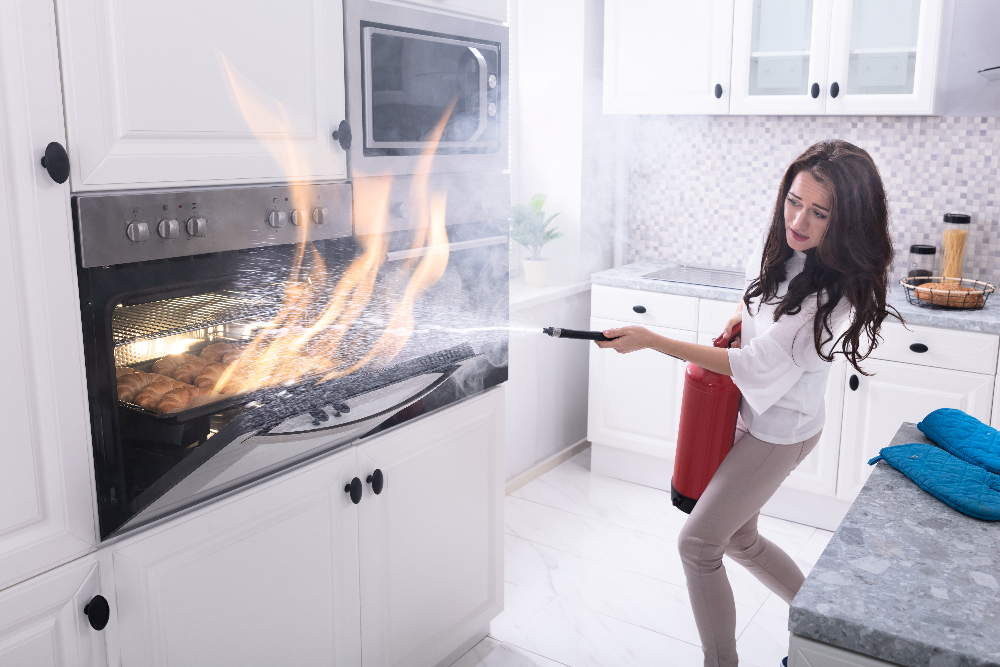2022-10-11
By: Advocate Brokerage

October is fire prevention month and this week your friends at Advocate Brokerage would like to share our favorite tips for fire prevention. In this blog, we will put our focus on Fire Safety at home.
Perhaps our most important piece of advice in keeping your home safe is to have a Central Station Fire alarm installed. Relying on smoke detectors does not offer enough protection. It is important that you have the right number of smoke detectors strategically placed in your home and that they are all working properly. You should have smoke detectors on every floor of your home and in each bedroom. To ensure they are always ready to go, change the batteries every six months and test them every month. If your alarm is centrally monitored, the smoke detectors should be hard-wired or have long-lasting batteries. Your alarm company will alert you if the batteries need to be replaced.
It is also very important to have fire extinguishers that are easily accessible. We recommend having at least one per floor. Some excellent places to keep them are the kitchen, the laundry room, the garage, and in your backyard near your outdoor kitchen. It is also a great idea to make sure everyone in the house knows how to use them.
Be safe with candles. Do not ever leave candles burning unattended. In a world filled with distractions, leaving the room for a minute when a candle is burning should be avoided. Also, never go to sleep when a candle is burning.
With the holiday season on the horizon, be sure you follow all safety precautions when it comes to decorating your home. Be smart with electrical outlets and extension cords. Don’t overload electrical outlets as this is a fire hazard.
One room in the home that you need to pay particular attention to fire safety is the kitchen. According to the NFPA (National Fire Protection Association) cooking is the #1 cause of home fires and home fire injury.
Fire Safety Tips For The Kitchen:
The warmth that comes from sitting at home in front of your fireplace is beyond compare! Make sure you do all you can to ensure that your fireplace is safe. First, be sure to have your chimney inspected and cleaned annually.
It is also important to remember that you should not light a fire without a safety screen or glass doors installed. If you have glass doors, it is a good idea to keep them open to allow air through, but it is important to keep the screen closed to prevent sparks that could start a fire.
Finally, use caution when you discard ash. Fireplace coals can remain hot enough to start a fire for up to three days, so always wait at least that long before removing the ashes. Never dump ash before it is cold and the fire has been fully extinguished and never put ash in a bag, garbage container or on your front porch. The safest way to dispose of ash is with a metal shovel into a metal bucket.
During fire prevention week we often encourage families to hold a family meeting to make sure everyone is up to date on all the fire safety best practices. Over dinner, you might find it helpful to review some of the suggestions above. Additionally, we suggest that every family should review their plan of escape in the event of a house fire. The NFPA suggests that your escape plan includes two ways out of every room in the house. Keep in mind that on average, in the event of a fire at home, your family would only have around 3 to 4 minutes to escape.
Our final piece of fire safety advice is to Close & Contain. To Close & Contain means that in the event of a fire, as you follow your escape plan, be sure to close each door behind you as you leave the room to stop the fire from spreading. Closing the door behind you as you go saves lives. Also, when you go to sleep at night, be sure to close your door to prevent the spread of any fire that breaks out in the middle of the night. The reason this works is that a closed door limits the fire’s oxygen
supply and can help to contain the fire. The closed-door slows down or stops the spread of flames, reduces the temperature, and reduces the emission of deadly Carbon Monoxide.
House fires are a tragedy and we want to do all we can to help you protect yourself and your family. If you need any help with the fire prevention tips listed above, get in touch with us at 914-723-7100. We would be happy to take the time to talk with you about it.